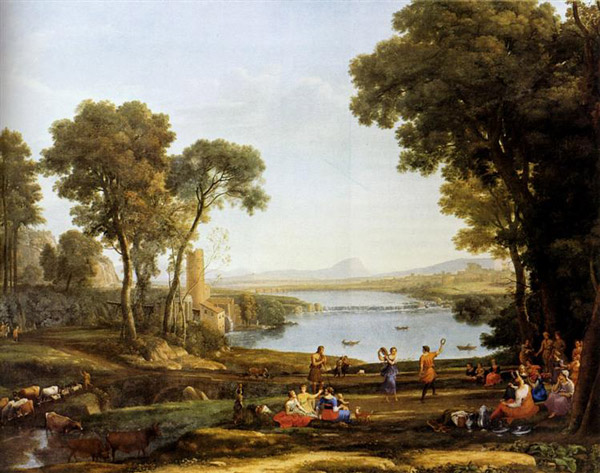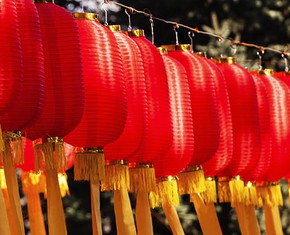The views expressed in our content reflect individual perspectives and do not represent the authoritative views of the Baha'i Faith.
To comfort his son Isaac after his mother’s death, Abraham decided to obtain a wife for him.
Any woman who planned to become Isaac’s wife would have to leave her own home and join him in Canaan, because Abraham did not want Isaac to leave the land God had promised to give to his descendants.
What’s more, Abraham wanted a relative rather than a Canaanite to be Isaac’s wife. So, to find the perfect mate, Abraham called upon a highly-trusted servant, asking him to travel all the way “to my homeland, to my relatives, and find a wife there for my son Isaac.” – Genesis 24:4.
The servant (presumed but not proven to be Abraham’s chief steward, Eliezar), “took ten of his master’s camels and departed, taking all kinds of choice gifts from his master; and he set out and went to Aram-naharaim, to the city of Nahor.” – Ibid., 24:10.
The city of Nahor named in Genesis was, almost certainly, the town of Harran—the place where the family and descendants of Abraham’s brother Nahor lived. Nahor had married Milcah, the daughter of Abraham’s youngest brother, Harran—the brother who died in Ur before the rest of the family was exiled from Ur to Harran. Milcah had subsequently given birth to eight children, and she and Nahor now had grandchildren as well, creating a large extended family from which a bride could be chosen.
When Eliezar arrived in Harran, the blazing afternoon sun was fading, and dusk was approaching. Many of the women of the town were gathered at the town’s primary well, obtaining water with which to replenish the containers at their homes.
Fully aware of the importance of finding the right wife for Isaac, a wife who would be kind and generous of spirit, Eliezar prayed for success: “let the girl to whom I shall say, ‘Please offer your jar that I may drink,’ and who shall say, ‘Drink, and I will water your camels’—let her be the one whom you have appointed for your servant Isaac. By this I shall know that you have shown steadfast love to my master.” – Ibid., 24:14.
An offer to draw water from the well for a visitor plus the visitor’s camels would be more than a small favor. It would be an act of palpable generosity because the well at Harran was not an easily accessible fountain or pool. Nor was it a simple hole in the ground with a bucket and rope. It was an underground spring that could only be approached by means of an inclined shaft. To get water, a woman had to walk down the slope, fill her jug and then walk back up again. Water weighs more than eight pounds a gallon, and a water jug of that period might hold three gallons, creating about twenty-five pounds of dead weight to be carried up the slope from the well on each trip, not to mention the additional weight of a two-handled ceramic jug.
Finishing his prayer, Eliezar approached Rebekah and said, “Please give me a little water from your jar.” – Ibid., 24:17.
“Drink, my lord,” Rebekah replied, and she “quickly lowered the jar to her hands and gave him a drink. After she had given him a drink, she said, ‘I’ll draw water for your camels too, until they have finished drinking.’ So she quickly emptied her jar into the trough, ran back to the well to draw more water, and drew enough for all his camels.” – Ibid., 24:18-20.
When the thirst of the camels was slaked, Eliezar took out three of the gifts that Abraham had provided: two gold bracelets and a gold nose ring. Judging by jewelry found nearby excavations, the ornaments were finely-crafted and decorated with lacy patterns of diminutive gold balls. Rebekah accepted the gifts, and when Eliezar asked if her house had room for him to spend the night, she cordially agreed: “We have plenty of both straw and feed, and a room to lodge in.” – Ibid., 24:25.
After Eliezar followed Rebekah home, he met with her father, Bethuel, and her brother, Laban, and explained his quest. They agreed that Rebekah could return to Canaan with Eliezar and marry Isaac. Then, in a move unusual at that time, they gave Rebekah the honor of deciding for herself whether or not she wanted to proceed with the marriage. She agreed and accompanied Eliezar to Canaan. Isaac was charmed and comforted by his bride, and everything was copacetic.
In the Book of Genesis, this whole bride-seeking adventure is written out in scrupulous detail. It is true that a wife for Isaac was imperative, but the account takes up so much space—more than all three of Abraham’s marriages—that one can’t help pondering the possibility of numerous mystical layers.
When Rebekah leaves Harran and her family to join Isaac and Abraham, she reunites a family that was torn apart when Abraham announced his new beliefs. Unlike her grandfather, Nahor, who did not join Abraham in exile, Rebekah is willing to journey to a strange land and follow Abraham’s teachings. Because she is Abraham’s great-niece as well as his daughter-in-law, she reinforces the bloodline and will play an important role in continuing his legacy. Her good character, plus the way in which she independently agrees to marry Isaac, also creates a scriptural model for how women should be treated (with respect) and how they should behave (with dignity, thoughtfulness, and generosity).
In many ways, Rebekah is to Isaac what Sarah was to Abraham. The account of her life establishes this relationship by presenting several events that are identical—or nearly so—to those of Sarah’s life. On reading the relevant verses in genesis about Sarah and Rebekah, one wonders how and why the parallels between the two women occurred. Are they a literal recitation of facts or—more likely—are they symbols of certain moral truths? Does the repetition exist precisely so that we will ponder the inner meanings of the stories? Is it possible the events demonstrate that women are just as important to the history of religion as men are? And does the yielding of an older son to a younger one represent the way in which an older, well-established religion is destined to be upset and then replaced by a newer and younger revelation from God?
Praise be unto Thee, O my God! Thou art He Who by a word of His mouth hath revolutionized the entire creation …. I bear witness, O my God, that through a word spoken by Thee in this Revelation all created things were made to expire, and through yet another word all such as Thou didst wish were, by Thy grace and bounty, endued with new life. – Baha’u’llah, Prayers and Meditations by Baha’u’llah, p. 42.

















Comments
Sign in or create an account
Continue with Googleor